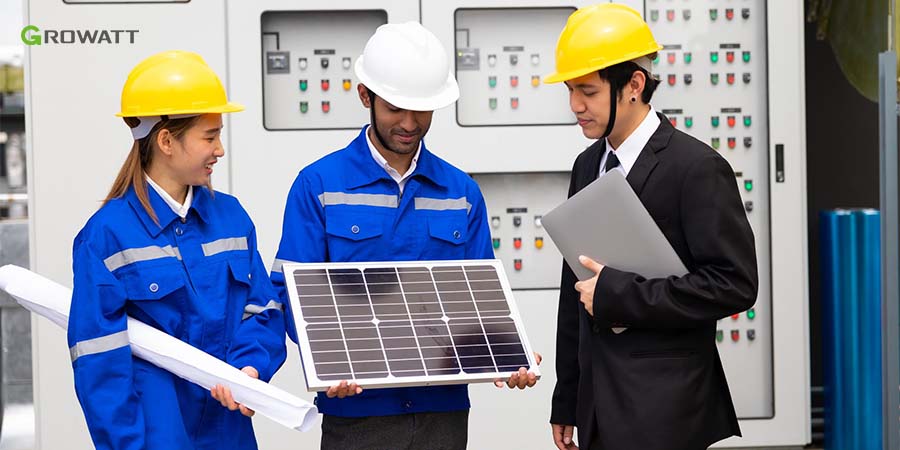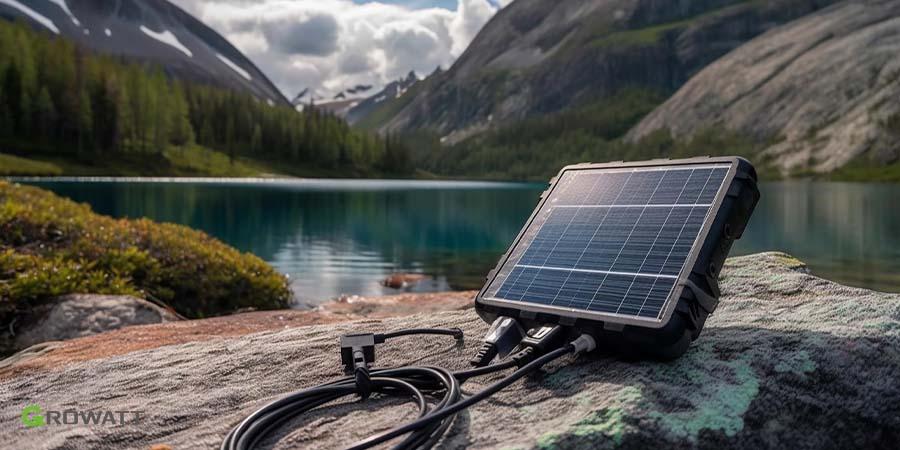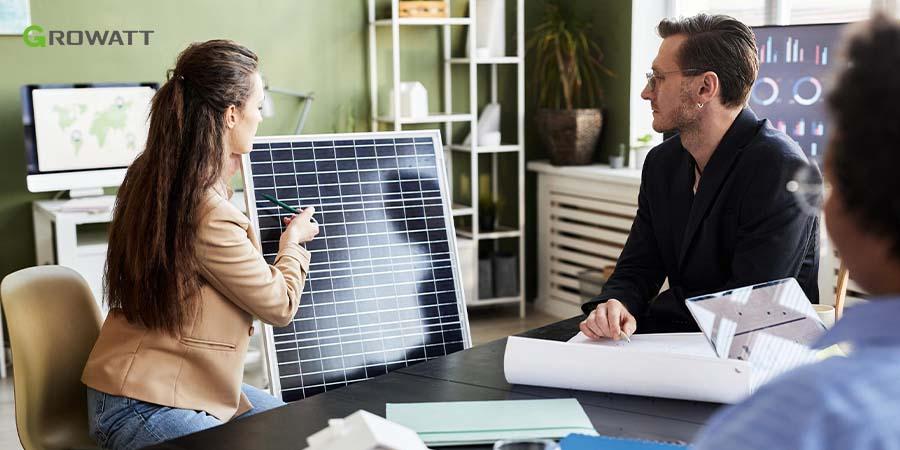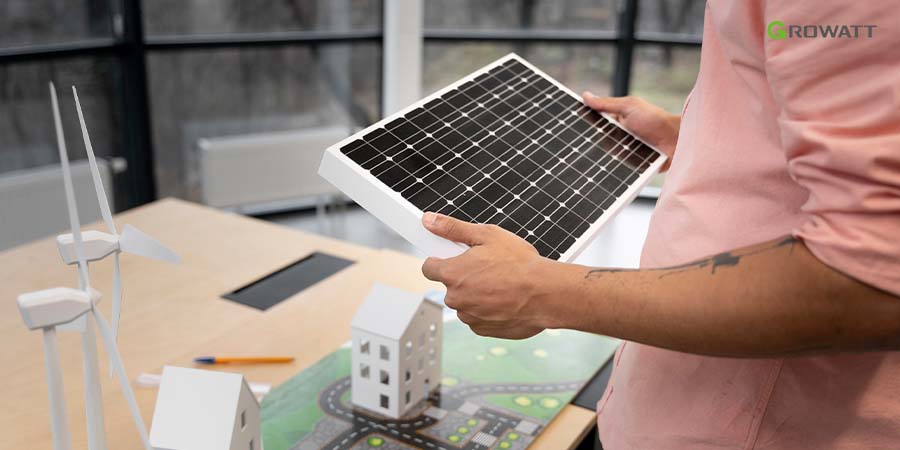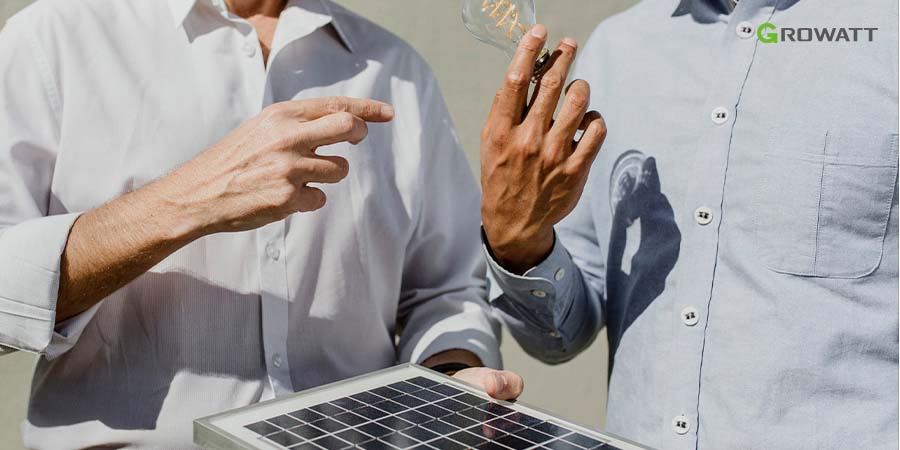Solar power has become a game-changer in an era where renewable energy sources are becoming more prevalent. Although solar panels are the most noticeable component of a solar energy system, the solar inverter is an unsung hero that operates in the background. The unsung heroes that transform the sunshine your solar panels collect into power your house or place of business can use are solar inverters. We will delve into the world of solar inverters in this extensive tutorial, explaining their functions, kinds, and the reasons owning one is essential to a solar power system. Whether you’re a solar enthusiast, a homeowner thinking about installing solar panels, or a business owner trying to save expenses on energy, this Solar inverter guide will provide you with the information you need to make wise choices on solar inverters.
Explaining How Solar Inverters Work
How do solar inverters function?
The unsung heroes of every solar energy system are solar inverters. Their vital function is to transform the direct current (DC) electricity produced by your solar panels into alternating current (AC) electricity, which is utilized in the grid and to power your house. This is a condensed view of how they accomplish this:
DC to AC Conversion: DC power is produced by solar panels and is a one-way electric charge flow. Solar inverters are used to transform this sort of electricity—which is unsuitable for powering your house or business—into AC electricity, a bidirectional flow of electric charge that is compatible with both the grid and your equipment.
- Adjusting Voltage: Inverters also control the generated electricity’s voltage to make sure it stays within the acceptable range for your appliances and the grid. This voltage management is essential for effectiveness and safety.
- Grid Synchronization: To ensure a smooth connection, solar inverters synchronize the AC power they produce with the grid’s electrical supply. In addition to preventing power outages, this synchronization makes it possible to compensate for any excess energy by feeding it back into the system.
Types of Solar Inverters
Solar inverters come in a variety of forms, each with special characteristics to meet certain requirements. The efficiency and performance of your solar system can be greatly impacted by the kind of inverter you select. The main categories of solar inverters are as follows:
1. String Inverters: The most popular kind, string inverters, are utilized in both home and business settings. After connecting every solar panel to a string, they transform the DC electricity they have produced into AC power. String inverters are inexpensive; however, they might lose efficiency because of panel mismatch or shade.
2. Microinverters: These devices convert DC electricity at the source and are mounted on each solar panel separately. Since each panel functions separately, this is perfect for setups where shade or panel mismatch is an issue. This may cost more even when it boosts efficiency.
3. Power Optimizers: String inverters and power optimizers function together. By minimizing the impacts of shadowing and panel mismatch, they maximize each solar panel’s performance. Power optimizers enable increased efficiency without the expensive expense of individual microinverters, providing a medium ground between string inverters and microinverters.
4. Hybrid Inverters: These cutting-edge inverters are made for setups that combine batteries and solar panels for energy storage. They offer backup power and energy cost savings by enabling you to store extra solar energy for use when the sun isn’t shining.
The Significance of Solar Inverter Use
Energy Usage and Solar Inverters
Increasing the energy efficiency of your solar panels is one of the strongest arguments for installing a solar inverter. Solar panels use light from the sun to create power; however, this electricity is DC. Your appliances and the grid are almost useless without an inverter. By converting DC electricity into AC electricity, solar inverters enable you to fully use the power of the sun and make it usable.
Grid Integration with Solar Inverters
For your solar energy system to be seamlessly linked to the grid, solar inverters are essential. They transform DC power into AC electricity that satisfies the voltage and frequency specifications of the grid. Among the advantages of this link are:
- reducing your reliance on the grid by using solar energy for your immediate needs.
- Receiving payment through feed-in tariffs or net metering for any excess energy you produce and return to the grid.
- Ensuring a steady and dependable power source even in the absence of sunlight.
Solar Inverters: Tracking and Managing
Contemporary solar inverters are frequently outfitted with control and monitoring functions that enable you to monitor the operation of your solar system closely. Benefits from these features include:
- real-time tracking of energy generation and use.
- finding any problems or faults with the system.
- Remote access via the internet or smartphone applications that let you change configurations and keep an eye on performance from any location.
Solar Inverters for a Future That Is Greener
You may actively contribute to a cleaner, more sustainable future by using solar inverters to harness solar energy. Since solar energy doesn’t use up resources or emit pollutants or noise, it is ecologically benign. By ensuring that the clean energy your panels produce can be easily incorporated into your house or place of business, solar inverters help you become less dependent on fossil fuels.
Choosing the Proper Solar Inverter
Things to Take Into Account While Selecting a Solar Inverter
For your particular demands, choosing the correct solar inverter is essential to ensuring optimal performance and value. There are several things to consider:
Inverter Type: Depending on your installation and budget, you may choose from hybrid inverters, power optimizers, string inverters, and microinverters.
1. System Size: The number of solar panels and the size of your solar energy system determine how big of an inverter you need.
2. Efficiency: The amount of energy produced by an inverter may be maximized by selecting one with a higher efficiency level. Seek out an EU (European Efficiency) rating that is high.
3. Warranty: The long-term functionality of your inverter depends on a solid warranty. Most inverters have warranties of five to twenty-five years.
4. Monitoring and Control: Take this into account if you want to track the performance of your system using sophisticated monitoring and control tools.
5. Compatibility: Check to see if your solar panels and the inverter are compatible, particularly if you are updating an old system.
6. Budget: The choice of inverter you make is heavily influenced by your budget. While being economical is important, don’t sacrifice dependability and quality.
reputable brands of inverters
To guarantee quality, dependability, and availability of customer assistance, you must choose a reputed brand for your solar inverter. Among the well-known producers of inverters is • SolarEdge, which is well-known for its hybrid and power-optimizing inverters as well as its sophisticated monitoring and control capabilities.
- Enphase Energy: a pioneer in microinverters, Enphase Energy offers dependable, high-caliber products.
- Fronius: This reputable brand of string inverters offers a large selection of goods fit for a variety of uses.
- SMA Solar Technology: Known for its high-efficiency devices and exceptional warranty terms, SMA is a world leader in solar inverter technology.
- ABB: With a strong reputation, ABB offers a wide selection of solar inverters for both home and commercial use.
Batteries and Solar Inverters
The Secret to Battery Storage Systems is Solar Inverters
An increasingly important component of solar energy is the interaction between battery storage systems and solar inverters. The following explains why solar inverters are essential to this setup:
Recharging and Depleting
Your solar inverter performs two functions in a solar energy system that include battery storage. It controls battery charging and draining in addition to converting DC power into AC electricity for instant usage. When solar output is strong, the inverter makes sure that any excess energy is kept in the batteries; when solar production is low or there are power interruptions, it takes electricity from the batteries.
Reserve Power
Solar inverters plus energy storage provide a dependable backup power supply for off-grid sites and areas vulnerable to power disruptions. The inverter can smoothly transition to battery power during blackouts, preserving the functionality of your vital appliances.
Energy Self-Sufficiency
You may improve your level of energy independence by combining your solar inverter with energy storage. Reducing your dependency on the grid and maybe saving money on energy bills is possible when you store extra energy during the day and use it at night or during periods of high demand.
The Impact of Solar Inverters on Return on Investment (ROI)
One of the most important things to think about when thinking about solar energy is your return on investment (ROI. Solar inverters may impact your ROI in a number of ways.
Enhanced Generation of Energy
You can maximize the amount of electricity your solar panels produce by ensuring that they work at their peak efficiency using a high-quality solar inverter. Your power costs may save more as a result of this increased energy generation, and your return on investment may accelerate.
Governmental Rewards
Governments in many areas provide subsidies and incentives to encourage the use of solar energy. Using authorized inverters and having your solar system linked to the grid are common requirements for these incentives. You can make sure you’re eligible for these incentives by choosing the correct inverter, which can greatly increase your return on investment.
Prolonged Guarantee
The normal warranty period for solar inverters is between five and twenty-five years. In addition to giving you peace of mind, a longer warranty may reduce future maintenance and replacement expenses.
Saves on Energy Storage
You may save even more money and boost your return on investment by combining energy storage with your solar inverter. By storing extra energy, you may utilize it when power rates are higher, and demand is at its highest, which lowers your total energy expenses.
Upkeep and Problem-Solving for Solar Inverters: Minimal Upkeep, Maximum Impact
Although solar inverters are usually low-maintenance equipment, it is crucial to routinely check their functionality to make sure your solar system is operating at its best. Here are some frequent troubleshooting concerns and maintenance tips:
Upkeep Advice
- Regular Cleaning: Maintaining the cleanliness of your solar panels will guarantee optimal energy output.
- Monitoring: Look for performance problems with your inverter by using its monitoring functions.
- Shadowing: Reduce or eliminate any items that cast shadows on your solar panels, as they may have an impact on the efficiency of the inverter.
Problem-solving
- Errors with Inverters: The majority of inverters include LED displays that provide error codes. To identify problems, go to your user handbook.
- Noisy Fan: If the fan on your inverter is noisy, it may be an indication that it is overheating. Make sure the area around the inverter is well-ventilated.
- No Output: Verify that the inverter is correctly connected to the solar panels and examine the circuit breakers if they stop providing power.
It is best to get assistance from a competent technician or your solar system supplier in the event of any severe problems or concerns.
conclusion
The unsung heroes of any solar energy system are solar inverters, which are essential in transforming the power produced by your solar panels into a form that can be used and connected to the grid. They play a crucial role in optimizing energy generation, attaining grid connectivity, and guaranteeing the dependability of your solar power setup.
When choosing a solar inverter, you should take into account many aspects, such as the kind of inverter, system size, efficiency, warranty, compatibility with your solar panels, budget, and features for monitoring and control. For all of your solar inverter needs, reputable companies like SolarEdge, Enphase Energy, Fronius, SMA Solar Technology, and ABB provide dependable options.
Combining energy storage devices with solar inverters improves energy independence, offers backup power during blackouts, and increases return on investment. It’s critical to check on the functionality of your solar inverter routinely and to take quick action to resolve any maintenance or troubleshooting difficulties.
Solar inverters are an essential part of the transition to a cleaner, more sustainable energy future. They serve as the foundation of your solar energy system and open the door to cost savings, energy independence, and a cleaner environment. Thus, don’t overlook the unsung hero—the solar inverter—if you’re thinking of using the sun’s electricity.

